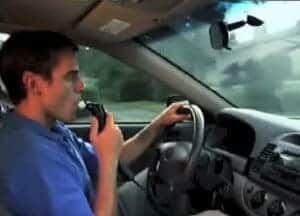
What Really Happens If I Fail My Ignition Interlock Breath Test?
Special Offers
you are going to have an ignition interlock device (IID) installed in your car, you might be worried about what can happen if you fail the breath test (blow an alcohol reading above the designated level).
What does happen after a fail depends on a couple of things — mainly, why you fail and when you fail. The important thing is not to panic. If you have not been drinking, you will be able to get back on the road and get on with your day. Just remember to keep calm and follow the instructions below.
Why you failed.
You can fail an IID breath test for one of several reasons. It might be that you used an alcohol-based mouthwash, or fermentation has turned a bit of fruit juice in your mouth to alcohol. Even the fermentation of yeast in bread or pizza dough could supply an alcohol molecule or two, could be enough to cause a fail. It might also be that you were drinking the night before, and there is some residual alcohol in your system.
When you failed.
There are two different times you will take a test on an ignition interlock:
- The initial test, performed when you start the car.
If you fail the initial ignition interlock breath test, your vehicle won’t start. You must wait a designated time — called the lockout period — before testing again. The lockout periods vary by state. In Washington State, for example, if you fail your initial test you can blow in the car breathalyzer again in 5 minutes. If you fail that one, you must wait 15 minutes. After that, the lockout periods are 45 minutes and 24 hours.
What to do: If you failed your initial test because of something you ate, just wash out your mouth and re-test. If you were drinking the night before, you need to wait until all the alcohol has dissipated from your system. It’s hard to calculate how long this takes, which is why it is recommended that you not drink any alcohol while an interlock is installed on your vehicle. Of course, if you were drinking prior to your initial test, you should not drive. Wait until you are fully sober.
2. The random re-test, which is done a few minutes after you begin driving and then as you drive, as determined by state regulations.
The procedure is different if you fail a random re-test. REMEMBER: The car will NOT ever stop operating, even if you fail a random retest. The lights and horn may activate, but the car will continue to operate.
What to do: If you blow a fail while driving, you must pull over as soon as possible and shut off the ignition. After 5 minutes, you will be asked to perform an initial test and start the car again.
IMPORTANT: Failing a random re-test puts your ignition interlock into Early Service Recall mode. You must take your vehicle to your service center to have it reset and have data downloaded. Call LifeSafer at 855-710-2423 as soon as safely possible to schedule an appointment at your service center for this reset and data download. Failure to do so can result in permanent lockouts that require towing.
If you fail your ignition interlock breath test it is not the end of the world. Just remember to keep calm and follow the above procedures, and you’ll be back on the road in no time. Ready to install your ignition interlock? Enroll now.
